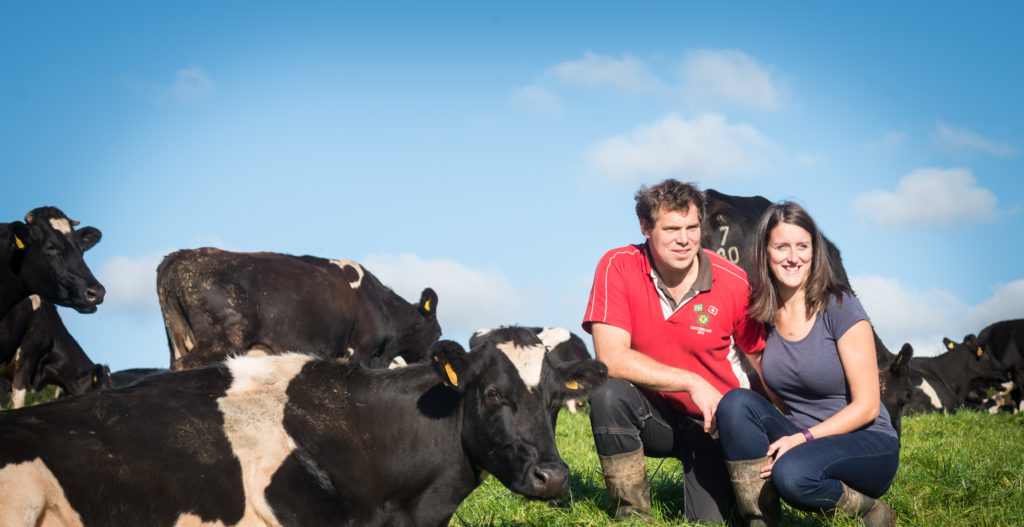
Farming needs to shake off its outdated image to attract the next generation of dynamic rural business leaders. That’s the view of Richard Tucker, who is making a name for himself as one of the South West’s brightest young farmers.
Being open minded, flexible and willing to adapt is vital if you want to succeed, according to Richard Tucker, who was named Best Young Farmer at this year’s Devon Farm Business Awards.
It’s advice that could apply to any industry, but particularly relevant to agriculture as the sector faces looming uncertainty around subsidies and the supply of migrant workers after Brexit.
Yet Richard is far from gloomy about the prospects for the next generation of farmers in the South West. Having returned to the family farm near Tiverton in Mid Devon 10 years ago, he has worked with his parents Nigel and Brenda to develop a thriving dairy farm business supplying milk to Arla.
“We are farming by choice,” he said. “It’s in my blood, but if there was no career in it I would do something else. I don’t feel I have a moral right to be farming. I enjoy it and get a lot of satisfaction, but if there was nothing in it, I wouldn’t do it.”
With a herd of 230 Friesian/Jersey cross breeds, the business has grown over the years as opportunities to farm more land have been taken. Most recently, the family took on neighbouring Ford Farm two years ago. They have also invested in improved buildings and equipment, while maintaining a prudent approach to long term borrowing.
Richard aims to be in a position to seize further opportunities to grow, with the target of having a net worth of £2million by 2020. His approach to building a sustainable farm business is based on keeping things simple and controlling costs.
Simplicity
“The fewer decisions you have to make, the fewer things can go wrong,” he said. “One of the key aspects of our business is managing the grass. We are more grass farmers than dairy farmers, and we just use the cows to eat it – but there isn’t much demand for grass in the supermarkets.”
This less intensive system of dairy farming, with comparatively low use of concentrate feeds, results in lower yields – at around 5,000 litres of milk a year per cow. But lower production costs mean margins remain healthy.
Richard’s family have been at Ditchett Farm since his grandad Arch took on the tenancy more than 70 years ago. The herd has grown from 180 cows when Richard became a partner in the family business to 230 today.
Now 33, Richard sees himself as building on the work of his parents.
“When I was growing up, they worked every waking hour,” he said. “Now they are still involved in the business, but they also have a chance to do other things. “I have really just carried on growing the seeds mum and dad have sown. We have progressed the business on, and I’m very fortunate that they have allowed me to do that.”
Experience
While studying for his agriculture degree at Harper Adams University in Shropshire, Richard spent a year in industry working for a babyleaf salad producer in Surrey. After university, he went travelling in Australia and New Zealand, where he also worked on farms. He is a firm believer that young people who have grown up around farming should gain experience elsewhere before they
join the family business.
“My message to any farmer’s son or daughter who is thinking of joining the industry would be don’t just work at home,” he said. “Go out there and work for someone else first. You will definitely learn something. “It opened my eyes to the wider world of agriculture and how things get from the farm to the consumer. And if you’re getting told off for doing something wrong by someone who isn’t your mum or dad, it means a lot more.”
Variety
While the challenges facing farmers – not least milk price volatility – are well documented, Richard insists a more upbeat message is needed to encourage the next generation to join the industry.
“Farming has to make an effort to sell itself a bit better,” he said. “We do have a bit of a reputation for being a bunch of moaners. The weather and prices are two things we can’t control, so we just have to manage them.
“Agriculture is not about leaning on a gate with a bit of straw sticking out the side of your mouth. To be a farmer now is quite challenging – you have to be a vet, a mechanic, an accountant and a businessman. That might put a few people off, but I think that variety, which other jobs don’t offer, might be agriculture’s selling point.”
Versatility is the quality today’s young farmers will need if they want to have a successful career, according to Richard, who enjoys playing rugby for Tiverton when he is not working on the farm.
“You have to have an ability to change and adapt to where your business is, where it’s going and what the consumer wants,” he said. “The future is quite bright if you can get out of your comfort zone and be open minded, flexible, perhaps a bit creative and not averse to change.”
Recognition
The Devon Farm Business Awards, organised by Addington Fund, Devon County Agricultural Association and Stephens Scown, took place on the eve of this year’s Devon County Show.
“The award means a lot because I have respect for the people who were there,” he said. “It’s a feather in my cap and maybe it will help if other opportunities come along.”
Described by the judges as a “very impressive young man”, Richard is passionate about sharing knowledge, not least as chairman of the Grass Masters discussion group, which
brings together grassland farmers in Devon and Cornwall to compare notes and tackle common problems.
He has also won plaudits for his efforts to educate children about where food comes from. When he visited a primary school in Exeter, where his partner Becky is a teacher, Richard found it wasn’t just the youngsters who were keen to learn about life on the farm.
“What stood out for me was that the teachers and parents were just as interested as the pupils, because they hadn’t been given that information when they were at school,” he said. “One of the big issues in society is that we have lost a generation of knowledge about food and farming, and we can’t afford to lose another one.”
Richard Tucker, Devon Young Farmer of the Year 2017
This article was first published in our rural newsletter Newslink.
Click here to join the mailing list

